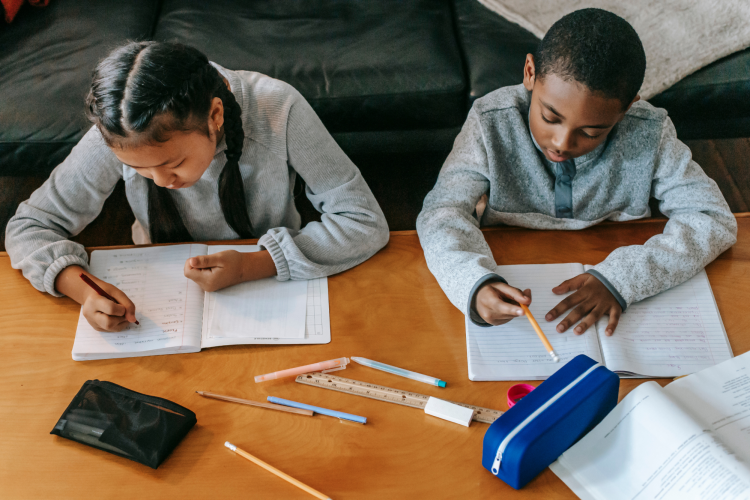Guide on How To Teach Kids Healthy Study Habits

Learning how to teach kids healthy study habits can feel like an uphill battle. Think back to your own school days... Remember staying up late to cram for tests? Or waiting until the last minute to start that big project? Most of us chose playing outside over math homework any day. But now that we’re responsible for guiding our own children, we want something better for them. We want them to feel confident, prepared and maybe even enjoy learning.
How to teach study habits in a way that actually sticks? It starts with small, manageable steps and a lot of encouragement. And if you're wondering how to make a lazy child study, the key may not be pushing harder, but teaching smarter. In this guide, we’ll explore tips on how to teach kids healthy study habits at home so they can build skills that last a lifetime.
Jump to Section
How To Teach Kids Good Study Habits

Teaching kids to study often starts with helping them use their time wisely and learn in ways that actually stick. When you know how to teach kids good study habits, you're giving them tools they'll use for life. Many caregivers wonder, "How can students develop good study habits?" or "How do you teach a child to study?” The answer starts with understanding how kids learn best. Every child is different, and the key is to make learning feel exciting rather than like a chore.
One of the best study skills for kids is helping them find what interests them. When children discover subjects they're passionate about, studying becomes something they want to do, not something they have to do. You can use this enthusiasm to show them that studying other subjects is just a stepping stone to learning about their favorite things. The right study skills can make studying even more effective and less stressful, with the ultimate goal being to inspire a lifelong love of learning.
Study Skills For Kids

So, what are some strategies for creating healthy study habits? Well, it’s important to introduce them to study techniques that actually work. The following study skills for kids are simple, effective and easy to start at home.
1. Cornell Note-Taking System
Teaching kids to take effective notes is a great way to develop good study habits. The Cornell system breaks a notebook page into three sections: keywords on the left, main notes on the right and a summary at the bottom. This layout encourages deeper thinking and better retention. Writing notes by hand also improves memory more than typing. So, when kids actively take notes or highlight important points while reading, they're more likely to remember what they learned.
2. The Pomodoro Technique

This time-management method involves 25 minutes of focused work, followed by a five-minute break. After four of these sessions, they can take a longer break of 15 to 30 minutes. It’s especially helpful for kids who struggle to concentrate for long periods. And if they're losing focus, it's okay to switch subjects and come back later. For example, they can study math for 25 minutes, then switch to reading.
3. Mind Mapping
Mind maps are visual tools that help organize ideas. Kids start with a central topic, then branch out into related ideas. This helps them see how concepts connect and it’s great for subjects like history, social studies or science. Mind mapping turns studying into a creative process, which is perfect for visual learners. It also makes complex information easier to understand and remember.
4. Self-Testing

Rather than just reading notes repeatedly, encourage your child to quiz themselves. They can make their own questions, summarize topics from memory or explain concepts they’ve learned back to you. This active approach strengthens their ability to remember information during tests.
5. Spaced Repetition
Instead of cramming before a test, encourage the child to review material regularly over time. That’s the idea behind spaced repetition. Reviewing flashcards or notes every few days helps kids store information in their long-term memory. This technique is especially useful for vocabulary words, math formulas, or facts that need to be memorized.
6. Mix It Up
Don't let your child spend too long on one topic. Switch between different subjects or types of problems during a study session. This might feel harder at first, but it helps them learn to think flexibly and make connections between different ideas.
How To Teach A Child To Study Independently

Helping kids become independent learners is one of the best things we can do for them. When children complete their own assignments, solve problems and work through challenges on their own, they gain confidence that becomes a foundation for lifelong success. It shows them that their effort matters and that positive results can come from their own hard work, not because a parent hovered or had to constantly remind them.
As parents, we can definitely support and guide. But when it comes to building study skills for kids, they need to take the lead. Learning how to study independently teaches kids responsibility, it can boost their self-esteem and it builds real-life problem-solving skills. It also lays the foundation for success in school and beyond.
Teaching kids healthy study habits they can use at home early on gives them tools they'll use throughout life, and it all starts with simple steps at home.
1. Set Up a Study-Friendly Space

A big reason many kids struggle with studying on their own is that they don’t have a place where they can focus. So the first step in teaching your child how to study effectively at home might be to show them how to create a quiet spot for schoolwork. Whether it’s the kitchen table or a small corner with headphones, it’s important that the space is consistent. You could even create a portable homework caddy with supplies like pencils, flashcards and notebooks so everything’s ready to go. This is one of the first steps in building strong study skills for kids, as it gives them ownership of their learning environment.
2. Learn Their Best Study Time
Some kids focus better in the morning, while others do their best thinking in the evening. Pay attention to when your child seems most alert and able to concentrate. Do they need silence? Or do they like soft background music? Understanding how your child works best is a key part of how to teach kids healthy study habits. If they tackle harder subjects when their brain is fresh, they’ll start to see that studying doesn't have to feel overwhelming.
3. Use Simple Checklists

One of the most effective ways to teach kids healthy study habits is by helping them create their own simple systems for staying organized. Breaking down tasks by subject can make them more manageable, while checklists can make the work feel less overwhelming. For example, they can create a writing checklist to review vocabulary words and a math checklist that reminds them to check their answers using a different method. Although simple, checklists can be incredibly useful for teaching study habits and giving kids control while reducing the need for constant reminders from parents.
4. Teach Them to Prioritize Tasks
Another part of how to teach study habits is learning how to prioritize. Some kids like to get the easy stuff out of the way first, while others prefer to tackle the tough assignments right away. Sit down together and figure out what works best for your child. Encourage them to look at due dates and think about how much energy each task will take. This helps them learn time management and decision-making, both essential parts of strong study skills for kids.
5. Make Homework More Engaging

After a long day at school, kids just want to play, relax or grab a snack — not do homework. But if we can help them see that learning connects to their interests, it becomes more meaningful. For example, if your child is reading about nutrition, you can invite them to plan dinner using the food groups. And if your science-loving Star Wars fan has a project due, let them explore light speed or space travel through their favorite characters. Even math can feel more real when kids see how it's used in everyday life, like measuring ingredients for a recipe or figuring out how many minutes until bedtime. This kind of creative thinking is part of how to teach kids good study habits that last.
6. Allow Space for Mistakes
When kids are learning how to study on their own, mistakes will happen. That’s okay. Failure is a natural part of the learning process. If we step back a bit and let the natural consequences happen, kids start to take more responsibility. They notice the details and realize that their choices matter. By encouraging effort and allowing room to grow, we’re showing our kids that independence doesn’t mean perfection. It means learning how to move forward.
How To Make A Lazy Child Study
Is your child showing resistance to homework time? You're not alone. Many parents struggle to motivate kids who seem uninterested in studying. The truth is, most children aren't actually lazy, they're often overwhelmed, discouraged or simply don't know where to start. The good news? There are positive ways to help your child build better study habits without turning homework into a battle. These strategies focus on understanding your child's unique needs and working together to create a supportive learning environment that sets them up for success.
1. Notice and Talk About Their Strengths

Start by identifying your child's natural abilities. Children often don't recognize their own talents, especially when they're frustrated with schoolwork. When you notice something they do well, point it out. Say things like, "You're great at explaining things to your little sister. That skill will help when you need to answer essay questions." This builds confidence and can be a great first step in how to make a lazy child study without pressure or criticism.
2. Work Through Challenges Together
It’s just as important for your child to understand what’s hard for them. Struggles with focus, organization or certain subjects aren’t signs of failure — they’re just areas that need more support. Let’s say your child has trouble sitting still for long periods. You can suggest breaking study time into smaller chunks, with short breaks in between. Or if they often need help with math, you could plan homework time when a parent, sibling or tutor is available.
3. Practice Asking for Help

Sometimes kids fall behind because they’re afraid to ask questions. But learning how to speak up is a powerful tool. Whether your child is confused by a lesson or stuck on homework, encourage them to ask a teacher or classmate for help. You can also model how to start these conversations. For example, practice saying, “I didn’t understand the worksheet; can you explain it?” Remind your child that needing help is normal and that even adults ask for support when they need it. Part of how to teach a child to study independently is showing them how to use the resources around them, including friends, family and teachers.
4. Encourage a Growth Mindset
Kids who believe they can get better with effort are more likely to stay motivated. This is called a growth mindset, and it’s key to building long-term study habits. Celebrate progress, not just perfect grades. Praise hard work and perseverance, even when results aren’t perfect. Say things like, “You worked really hard on that science project” or “It’s okay that it was tough, you kept trying.” This mindset helps your child stay engaged and resilient, even when learning gets hard.
5. Create a Supportive Study Environment

If you want to know how to teach kids healthy study habits at home, think about what the environment feels like. Is there a quiet spot to work? Are materials easy to access? Is the schedule predictable? Keeping a consistent routine helps children know what to expect. You can even build in breaks for movement, downtime and healthy snacks for kids, which can improve focus and energy.
6. Partner With Teachers and Schools
Events like back to school night are a great time to connect with teachers and learn how your child is doing. It also gives you a chance to ask how you can support study habits at home. Teachers may have insight into your child’s strengths and challenges. Staying connected with them shows your child that learning is a team effort, and that you’re there to support them every step of the way.
How To Teach Your Child To Study For Exams
Does your child freeze up at the mention of an upcoming test, or do they struggle to prepare effectively? Learning how to teach your child to study for exams doesn’t have to be stressful for either of you. In fact, with the right approach, studying can become a positive part of their daily routine that builds confidence rather than anxiety.
1. Encourage Breaks and Rest

Studying for hours without a break can be exhausting, and it’s not very effective. Instead, encourage your child to take regular breaks and spread their studying out over time. This approach reduces stress and makes it easier to remember what they’ve learned. It’s one of the best answers to how to teach kids healthy study habits. Short breaks between subjects also help the brain reset. Let them move around, grab a glass of water or have a brain-boosting snack. Speaking of snacks, keep healthy snacks for kids on hand during study time to keep their energy up.
2. Build a Simple Study Plan
A study plan doesn’t need to be complicated. It can be as simple as sitting down with your child and creating a weekly routine that includes short study times. You’ll also want to make sure that they review new information soon after they learn it and then again a few days later. This’ll keep everything fresh in their mind, especially when preparing for exams.
Mixing up subjects within a session can also help. This is called interleaving. For example, they can switch between math and science instead of doing one subject for a long stretch. Just be sure they understand one topic before jumping to the next. If you're asking how to teach your child to study for exams, this kind of routine gives them structure and reduces last-minute stress.
3. Stick to a Consistent Study Schedule

A regular study schedule helps kids get into a rhythm. Choose the same time each day, if possible, so studying becomes part of their routine, just like brushing their teeth. This helps cut down on procrastination and last-minute panic. Balance is important, too. Make sure there's enough time for schoolwork, after-school activities, free time and rest. This kind of structure supports healthy habits and helps kids feel more in control.
4. Set Goals and Celebrate Progress
Kids feel more motivated when they can see how far they’ve come. Give them a notebook or journal where they can write down their goals. Maybe they want to improve in spelling, learn their times tables or prepare for an upcoming quiz. Check in together once a week to celebrate wins and talk about what’s working. This builds confidence and encourages self-discipline, two key parts of how to teach kids healthy study habits.
5. Minimize Distractions

A quiet, organized space can make a big difference. If your child gets distracted by the internet, try turning off Wi-Fi during study time or setting up web blockers. Before they start, open any websites they’ll need so they’re ready to go. Help them make a list of everything they have going on, like soccer practice or chores, so they can figure out the best times to study. This planning helps them feel less overwhelmed and more in control of their time.
6. Speak Up If It’s Too Much
If your child is feeling overloaded, it’s okay to step in. Reach out to their teacher to talk about the amount of homework. The goal of homework is to help them learn, not to cause stress or frustration.
7. Keep the Big Picture in Mind

While it’s great to aim for good grades, remember to focus on the bigger picture. Your child’s emotional well-being, sleep, fitness and social life all matter too. Encourage learning for the sake of learning, not just for marks. A positive attitude helps kids enjoy the process and feel proud of what they’re learning. High stress, on the other hand, can make it harder to learn and remember things.
8. Don’t Forget Nutrition and Sleep
Healthy minds need healthy bodies. Make sure your child is getting enough sleep each night and staying active during the day. Fueling their brain with good food also helps them focus and feel their best. Mornings can be busy, but don’t skip breakfast. Look for easy breakfast ideas for kids that include protein and whole grains to help them stay energized through the day.
Teaching your child healthy study habits doesn't happen overnight, but every small step counts. Start small, stay patient and keep in mind that every child learns differently and at their own pace. With your support and encouragement, you can raise a confident learner who knows how to tackle challenges, while helping them build skills that will serve them well into adulthood.
For even more fun ideas on how to keep your kids active, engaged and focused, check out other experiences happening on Classpop!

